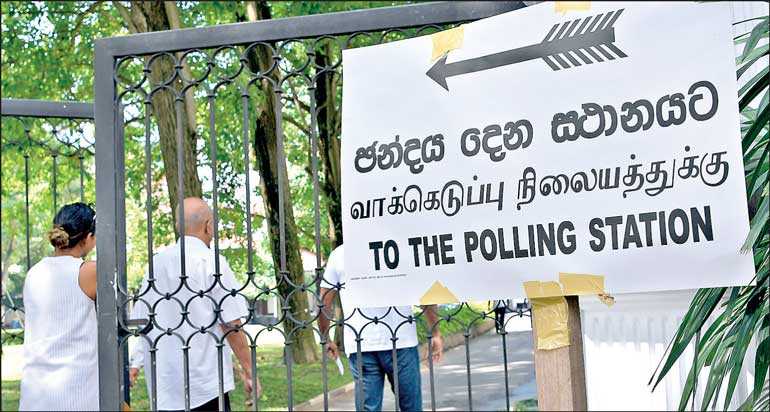Friday Feb 13, 2026
Friday Feb 13, 2026
Thursday, 29 April 2021 00:00 - - {{hitsCtrl.values.hits}}

As we know, the PCs are aptly labelled as ‘white elephants’ in view of the huge cost involved in maintaining more than 550 provincial councillors and the related infrastructure constituting nine Provincial Parliaments without much tangible benefit. The enormous cost of holding a PC election will further burden the taxpayer – Pic by Shehan Gunasekara
After much political bickering it is now reported in the press that Provincial Council (PC) Elections will be held as early as possible.
possible.
If it has been decided to hold it under the much-despised ‘Preference Voting’ (PV) system, it is tantamount to a patent reversal of the much-avowed election promise given by all political parties to abolish the PV system.
Whither electoral reforms?
The writer has submitted a comprehensive package of proposals on electoral reforms several times during the recent past through the press with copies to, Election Commission, President’s Office, PM’s Office, Ministry of Provincial Councils and Local Government, civil organisations and individuals to of no avail.
The package addressed several important national imperatives triggering from the emerging political culture, which were not adequately dealt with even under the new ‘Mixed Voting’ system’ which went in to disarray due to several reasons as mentioned towards the end of this article.
Achieve primary objective
Firstly, apply simple proportionate arithmetic to district level valid votes of main contesting parties/ alliances (excluding total votes categorised under ‘Others’ and ignoring bonus seats and 5% minimum vote requirement), in order to ensure that every single valid vote will carry an equal value epitomising the basic requirement of any election by vote. Further, it will accurately determine the real number of seats won by contesting parties/alliances in each district/province particularly under a representative democracy.
Achieve secondary objective
Replace the wasteful and unproductive ‘Preference Voting’ (PV) system by simple, cost and time saving ‘district wise party merit lists’ carrying names of clean, political professionals (‘horses’ not ‘donkeys’!) selected under robust eligibility criteria, in merit order allowing the voter to cast only one vote for the alliance/party of his choice based on the party manifesto and its district list of political professionals. Such a PC would surely not pave the way for ‘hung-PCs’ and ‘cross-overs,’ etc. as any removal/resignation/death of any PC member would allow automatic replacement from the respective ‘district party merit list’.
Selection of clean, political professionals
The successful achievement of the secondary objective mentioned above, depends on proper identification and selection of candidates in merit order by the contesting parties against a set of eligibility criteria laid down by the Election Commission in consultation with voters’ organisations such as Paffrel, Caffe and CMEV. The first step in this direction was taken by Paffrel in the form of the ‘March 12th Declaration’ in 2015. Now it is only a matter of improving on those criteria and legalising them as specific eligibility criteria for all candidates.
In this regard, a ‘Citizen’s wish list’ by the writer titled ‘Criteria for selecting election candidates’ was also published in the press and copies were sent to the concerned authorities. The contesting parties will be required to establish and execute a robust, transparent and structured interview procedure to select their candidates in merit order for each district. As a result, the oft repeated accusation that the party leader will select his ‘henchaiyas’ will not arise.
Additional advantages
Readers will appreciate that in addition to benefits arising from the removal of PV system, the following advantages too will accrue to the system, candidates, and the country at large.
1) Simplification of the work-load of the Elections Department due to removal of rigorous counting of ‘Preference Votes’ paving the way for election results to be announced before midnight resulting in a tremendous saving of time, manpower and money. Our electoral system should be simple and affordable to the taxpayer.
2) Since the selection of candidates in merit order is fully entrusted to the parties concerned, the campaign funds will have to be raised and handled by the respective alliance/party head offices in a transparent manner. As a result, candidates will be prevented from raising funds locally for their individual campaigns thereby absolving them from potential allegations of bribery and corruption.
3) Clean and educated candidates lacking finances can come forward to serve the country to replace village level thugs and undesirable, shady characters.
4) The Election Commission will find it easier to monitor the campaign expenditure of alliances/parties.
New ‘Mixed Voting’ (MV) system
The new ‘Mixed Voting’ (MV) system that was tested with the last Local Government Elections (2018) was confronted with enormous ‘overhang’ problems, delays and complexities leading to a dramatic but wasteful increase (nearly threefold) in the total number of Local Government members without any benefit to the taxpayer. It culminated in an indefinite postponement of the PC Elections due to issues in the delimitation exercise.
Besides, what is so sacred about the 60:40 or 50:50 mix in the ‘First-Past-the-Post’ (FPP) and Proportionate
Representation (PR) systems? As no scientific basis has been adduced, one can always argue for a 55:45 or 65:35 mix. Therefore, MV system is ad hoc and debatable. We won’t be surprised if the MV system is applied, the number of provincial councillors will finally end up at more than 1,000, adding insult to injury to the already-burdened taxpayer. Also, the 25% women’s participation cannot be ensured under this system.
Conclusion As we know, the PCs are aptly labelled as ‘white elephants’ in view of the huge cost involved in maintaining more than 550 provincial councillors and the related infrastructure constituting nine Provincial Parliaments without much tangible benefit. The enormous cost of holding a PC election will further burden the taxpayer.
As the Elections Commission and the Ministry of Provincial Councils and Local Government are so hard pressed to conduct PC elections as early as possible, they would inevitably be discouraged from proceeding with the rigmarole of amending the relevant Acts to accommodate this proposal.
In my view, only unabated civilian pressure through civil rights organisations and patriotic political will can bring about this paradigm shift in Sri Lankan political culture before the Provincial Council Elections. Therefore, we earnestly appeal to all sensible citizens, academics, politicians and civil activists to advance this simple proposal with an open mind and persuade the authorities to at least ensure selection of a lesser number of clean, political professionals as mentioned above to obtain a better return on this huge investment in political Administration that drains the resources of our country already loaded with a colossal debt portfolio and low productivity.